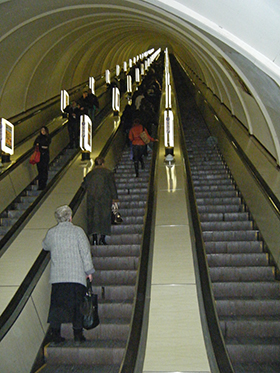314. No Dubbing!
Vol verwachting begon ik aan het genoemde artikel, maar waar het me om ging ontbrak. Dan dus maar even hier:
Ooit hadden we 'Het IJzeren Gordijn', tussen het communistische Oosten en het kapitalistische Westen. Daarna hadden we 'Het Glazen Plafond', waar vrouwen hun hoofd tegen stootten in een door mannen gedomineerde samenleving.
En nu hebben we wat ik 'De Apartleving' noem. In theorie kunnen we van meer meningen kennisnemen dan ooit tevoren, maar we doen het niet. Sterker, optisch krioelen we boven de grond als samenleving door elkaar, maar ondertussen sluiten we ons steeds meer voor elkaar af. Alsof we ons al smartphonend, geoordopt en gekoptelefoond voortbewegen in onzichtbare loopgraven.
Onderzoek in testsituaties toont aan dat we zelfs bereid zijn geld mis te lopen als we daarmee geen kennis hoeven te nemen van andere meningen dan de onze. In de werkelijke wereld worden we daarbij geholpen door algoritmes die ervoor zorgen dat we in het spoor blijven waar we al in zaten.

Ook dubbing voorkomt het in contact komen met het vreemde. Terwijl het luisteren naar andere talen, zelfs al versta je ze niet, je horizon verruimt. Alleen al het horen van die voor jou vreemde klanken verrijkt je.
Eigenlijk zou je dubbing beter 'dumbing' kunnen noemen. Je wordt (of blijft) er bekrompen van.
Italianen, Duitsers, het grootste deel van de wereldbevolking kijkt naar beelden met geamputeerd geluid. De Japanners in 'The Seven Samurai' spreken Italiaans in Italië en in Duitsland Duits. Alsof je naar de bovenkant van een paard kijkt op het onderstel van een zebra.

'Nou, en toen zei ik tegen Henk...'.
Als je beeld en origineel geluid van elkaar scheidt ontneem je het geheel de ziel en de kijker de kans om daarmee in contact te komen. Misschien is dat wat veel kijkers ook willen. Aapjes kijken vanachter het hek in de dierentuin. Dichterbij liever niet.
Maar in een samenleving gaat samenleven beter als je de ander ook eens hoort in
Originalfassung
Version originale
Upprunalega útgáfa
Originali versija
মূল সংস্করণ
Orijinal versiyonu
Phiên bản gốc
en zo.

Blog 14. De Beste Wens (voor Italië)
Een teloorgegaan fenomeen gaf je vroeger nog een extra kans om kennis te nemen van wat derden dachten. Zie:
Blog 49. Liften
TERZIJDE
Dubbing afschaffen zou in niet-Engelstalige landen vaak ook gratis les betekenen in het Engels, de lingua franca van vandaag.
Ook helpt ondertiteling, waar nodig, bij leren lezen.
In mijn lokale bioscoop, in Amsterdam, worden Engelstalige films tegenwoordig 'puur' vertoond en niet-Engelstalige films met Engelse ondertiteling.
Reactie van filmmaker Michael Dudok de Wit
(zonder subtitels)
I agree with you regarding the artistic poverty of dubbing, even dubbing directed and acted by top professionals, and my friends, my colleagues and I consistently avoid dubbed films whenever we can. You and I are lucky, we grew up in a country with a tradition of subtitled films and TV shows and we learned at an early age to appreciate the actors’ authentic voices.
However, your article, short as it was, didn’t consider the following: some people can’t read subtitles.
A few years ago I spoke about the subject of dubbing with the international distribution department of Studio Ghibli in Tokyo - you know, the studio behind many extraordinary animated features, such as My Neighbour Totoro and Spirited Away. I asked them why they chose to dub their features for the English speaking countries and also for a selection of other countries. I explained that when I hear a Japanese character speak with a non-Japanese voice, I find it harder to identify with the character and I know that I’m not at all unique. That’s when Ghibli reminded me that a considerable percentage of their films’ audiences is too young to read subtitles at a comfortable speed.
They also mentioned another reason: spectators spend less time appreciating the images when they have to concentrate on texts. I can identify with that concern, since, as a film lover and a filmmaker, I care greatly about the visual seduction of a film.
Obviously your article is aimed at readers, but not everybody on our planet has learned to read and why shouldn’t they appreciate a film with a good dialogue?
I happen to be in Mumbai for a few days, for a film festival actually, and about a quarter of the total population in India is illiterate.
As I said, when watching foreign-language films, I’ll always prefer the subtitled versions to the dubbed ones. But there is an art to subtitling, and some of those films have been mistreated. For instance, when we watch a film with exquisite, sensitive visuals, a feast for the eye, and if those images happen to play with dark colours and subtle light effects, it can be such a pity to see bright, white subtitle texts interfere with the image. Besides, some subtitles are far too large or they have a pixel-ish crudeness.
*
Mijn vraag: waarom geen échte subtitels, die geprojecteerd worden onder het beeld?
Zoals je in theaters soms boventiteling ziet.
*
Dudok de Wits eigen animatiefilms hebben door een universele beeldtaal doorgaans geen enkele vorm van vertaling nodig.
Eerder op deze site: een bespreking van
THE RED TURTLE
